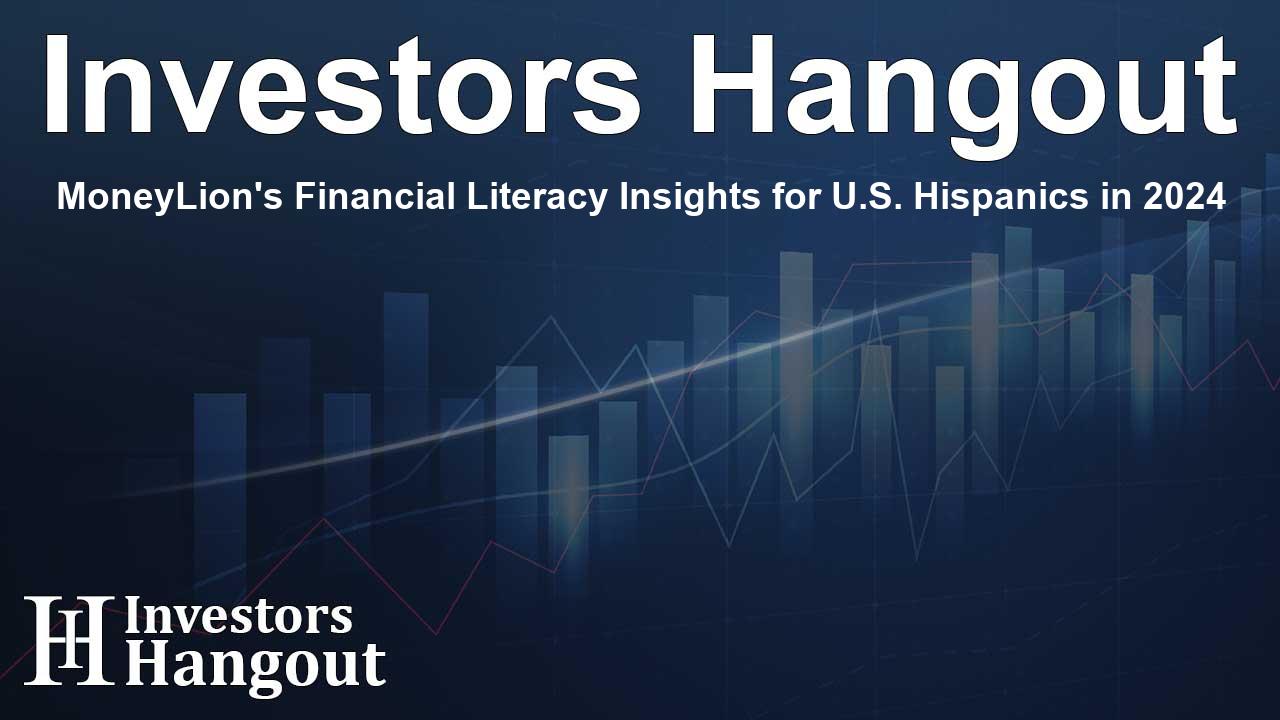MoneyLion's Financial Literacy Insights for U.S. Hispanics in 2024

MoneyLion's Financial Literacy Insights for U.S. Hispanics in 2024
In a significant effort to enhance financial understanding within the U.S. Hispanic community, MoneyLion, a digital financial platform, has released findings from their latest financial literacy report. This comprehensive study sheds light on the changing financial landscape for U.S. Hispanics, particularly as we navigate 2024.
Understanding Financial Literacy Among U.S. Hispanics
The report highlights key perceptions regarding financial resources and education within the Hispanic community in America. The survey, conducted by The Harris Poll and commissioned by MoneyLion, reveals a stark need for accessible financial education tailored to meet the unique challenges faced by Hispanics in the U.S.
The Role of Financial Education
Financial literacy is essential for individuals to make informed financial decisions. The report indicates substantial gaps in knowledge, particularly when comparing the U.S. Hispanic population's financial literacy rates to those of their Non-Hispanic counterparts. Understanding these disparities is crucial to bridging the financial education divide.
Key Findings of the Report
One of the standout discoveries is the evolving resource preferences for accessing financial information. Here are crucial findings from the report:
- Preference for Social Media: Approximately 24% of U.S. Hispanics seek financial guidance via social media, as opposed to 17% of Non-Hispanics.
- Strong Interest in Financial Education: A notable 45% of U.S. Hispanics are eager to learn about saving money, surpassing the 33% interest seen in Non-Hispanics.
- Time Constraints: Many Hispanics, about 68%, report limited time to engage with financial tools, highlighting the necessity for quicker, more accessible learning options.
- Financial Literacy Disparity: The survey showed that U.S. Hispanics have a financial literacy rate of 54%, significantly lower than the 69% seen in Non-Hispanics.
- Gaps in Financial Planning: U.S. Hispanics are less likely to have an emergency fund or participate in retirement accounts compared to Non-Hispanics.
- Political Engagement: A significant 74% of U.S. Hispanics express greater support for candidates emphasizing financial literacy as a key topic.
The Voices Behind the Research
Yuka Yoneda, the Vice President of Content Marketing at MoneyLion, articulated the agency’s commitment to promoting financial empowerment, emphasizing the barriers many Hispanics face in achieving financial literacy. Understanding the preferences for engaging formats like short videos can help tailor educational resources effectively.
MoneyLion's Initiatives for Financial Education
In addition to the report, MoneyLion launched a new season of their innovative content series, “No Stupid Questions.” This series is hosted by financial educator and social media influencer Lea Landaverde, designed to demystify financial concepts in approachable, bite-sized videos. These episodes aim to cater to the needs of diverse audiences seeking straightforward financial education.
By curating content that resonates with individuals in a relatable manner, MoneyLion aims to empower U.S. Hispanics by enhancing their financial confidence and knowledge.
The Essence of MoneyLion's Mission
MoneyLion's overarching goal revolves around providing tools and resources that can help users take control of their financial futures. The company believes in making financial education accessible, emphasizing the importance of personalized services that fit the lifestyles of everyday people.
This holistic approach to financial health not only aims to elevate personal finance capabilities among U.S. Hispanics but also nurtures a more informed community overall.
Frequently Asked Questions
What is the main focus of MoneyLion's recent report?
The report emphasizes financial literacy among U.S. Hispanics, revealing key insights into their financial knowledge and education needs.
How does social media influence financial education among U.S. Hispanics?
About 24% of U.S. Hispanics use social media for financial guidance, illustrating a shift towards non-traditional resources for learning.
Why is financial literacy important for the Hispanic community?
Improving financial literacy empowers individuals to make informed financial decisions, leading to better financial stability and confidence.
What initiatives has MoneyLion implemented for financial education?
MoneyLion has launched a content series called “No Stupid Questions” aimed at providing accessible financial education through engaging video content.
What are the reported financial literacy rates among U.S. Hispanics?
The survey reports a financial literacy rate of 54% among U.S. Hispanics, significantly lower than that of Non-Hispanics, which stands at 69%.
About Investors Hangout
Investors Hangout is a leading online stock forum for financial discussion and learning, offering a wide range of free tools and resources. It draws in traders of all levels, who exchange market knowledge, investigate trading tactics, and keep an eye on industry developments in real time. Featuring financial articles, stock message boards, quotes, charts, company profiles, and live news updates. Through cooperative learning and a wealth of informational resources, it helps users from novices creating their first portfolios to experts honing their techniques. Join Investors Hangout today: https://investorshangout.com/
Disclaimer: The content of this article is solely for general informational purposes only; it does not represent legal, financial, or investment advice. Investors Hangout does not offer financial advice; the author is not a licensed financial advisor. Consult a qualified advisor before making any financial or investment decisions based on this article. The author's interpretation of publicly available data shapes the opinions presented here; as a result, they should not be taken as advice to purchase, sell, or hold any securities mentioned or any other investments. The author does not guarantee the accuracy, completeness, or timeliness of any material, providing it "as is." Information and market conditions may change; past performance is not indicative of future outcomes. If any of the material offered here is inaccurate, please contact us for corrections.